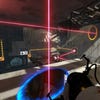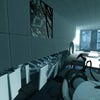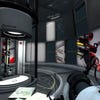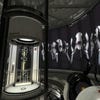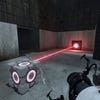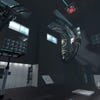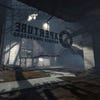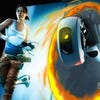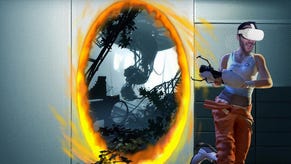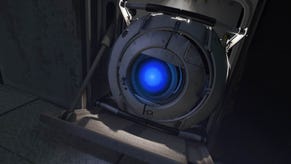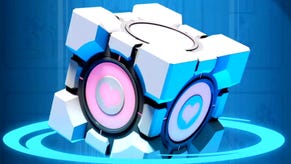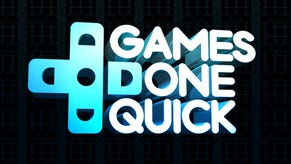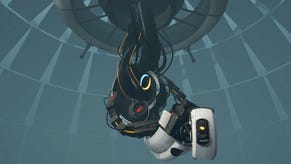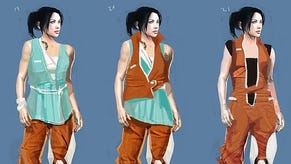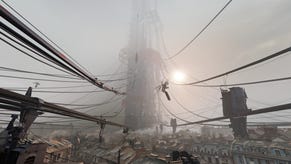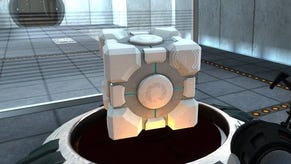Portal 2
The sound of science.
Portal is perfect. Valve's 2007 puzzle adventure – a short story about escape, in which the player must solve a series of spatial riddles with a gun that shoots doors – has a ruthless clarity to it, an economy of form and expression, that few games can match.
Its creators took one fantastic idea and developed it exactly as far as it needed to go and no further. They teased you with a premise that mocks your status as a lab rat running through their devious maze. They gave that mockery a cool, cruel and bitterly dry voice in GLaDOS, the arch AI that keeps you company in the game's pristine prison cells.
And then they lifted the curtain, just an inch, and let you look behind it. They almost surreptitiously slipped a neat parable of a story past you, sealing it with a punchline so resounding it knocks you back in your seat.
You can't call Portal heartless, it's far too funny a game for that, but it does have a heart of ice. It's so tight, so deliciously underplayed, that criticism passes through it like light refracted through a jewel.
Very little of this is true of Portal 2. It would be impossible to expand that haiku of a game into a 10-hour blockbuster (with a separate co-operative campaign for two players) without muddying those crystal waters. Inevitably, it's more talkative, the humour is broader, it contains some ideas that don't work as reliably, and the fiction's delicate relationship with the Half-Life universe is disturbed.
But the sacrifices are worth it a thousand times over. Portal 2 is a riveting and hilarious entertainment. It has Uncharted 2's easy way with a one-liner or action set-piece married to the intricate brain-teasing logic of the best Zelda dungeons. (Far from insignificantly, it's also a major video game that involves virtually no combat.)
Although its warped humour is miles away from Half-Life 2's oppressive tone, it is absolutely recognisable as that game's successor and equal, and thus the first full-scale Valve epic in over six years.
This is a new Valve, though, riffing on the cartoon comedy of Team Fortress 2 and the weathered B-movie pastiche of Left 4 Dead as well as its stock-in-trade cool sci-fi. That's clear from the opening, when you awake in a containment cell that's not an antiseptic glass cubicle but a simulacrum of a shabby 1970s-style motel room. The tutorial for the controls even contains a brilliant interactive gag at Valve's own expense.
Once again, you are Chell, the ponytailed woman in the orange jumpsuit who was GLaDOS's unwilling test subject in Portal. Many years later, a disaster appears to have befallen Aperture Science's labs and the clean white tiles of familiar test chambers are cracked and overgrown with vegetation.
You're woken from stasis by a chatty idiot of an AI called Wheatley, an expressive steel eyeball given verbal diarrhoea and an English West Country twang by Stephen Merchant (Ricky Gervais' writing partner on The Office). Wheatley begins as your guide and comic foil, a village-idiot version of Halo's 343 Guilty Spark.
When your sardonic, deadpan tormentor GLaDOS is rebooted, a strange and darkly funny psychodrama starts to develop between these disembodied voices and your silent avatar. Another commentator joins this intimate cast during an unexpected second act, which parodies BioShock while shedding some light on Aperture's past – but I really should stop there.
The script, by Eric Wolpaw, Jay Pinkerton and Chet Faliszek, is a riot. It's both shameless and devastatingly successful in its pursuit of belly laughs as GLaDOS gradually lets her bone-dry quips slip into withering sarcasm and Wheatley does that Britcom blend of surreal nonsense, self-mocking blather and slapstick. Portal was a sequence of great jokes, but Portal 2 is that rare beast, an actual video game comedy – and one of the funniest ever.
That's also thanks to the great voice cast. Merchant's prattle might chafe with some players, but I loved his deflating, humanising effect on Portal's cold brilliance. As GlaDOS, Ellen McLain manages the difficult task of taking a sociopathic and bitchy computer on a personal journey, and there's a splendid turn from veteran US character actor J. K. Simmons.
Valve's animators should also take a bow. Without much warning, they have revealed themselves to be some of the best in the business, delivering work of exquisite, movie-quality detail and timing.

